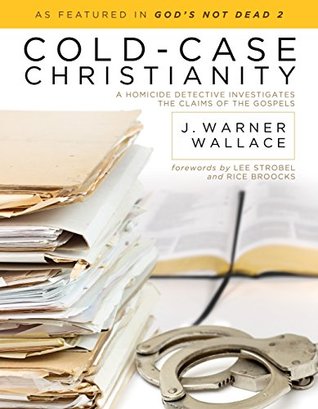More on this book
Community
Kindle Notes & Highlights
Read between
May 23 - July 25, 2018
While Mark knew that his vest could sustain the impact of a .45-caliber round, tonight he trusted in the vest for the very first time. In that singular moment, Mark went from “belief that” to “belief in.” It’s one thing to believe that the vest can save a life; it’s another thing to trust it to save your own life.
Lewis correctly noted, “Christianity is a statement which, if false, is of no importance, and, if true, is of infinite importance. The one thing it cannot be is moderately important.”
All of us hold presuppositions that can impact the way we see the world around us.
you simply cannot enter into an investigation with a philosophy that dictates the outcome.
Objectivity is paramount; this is the first principle of detective work that each of us must learn.
Philosophical naturalism rejects the existence of supernatural agents, powers, beings, or realities. It begins with the foundational premise that natural laws and forces alone can account for every phenomenon under examination.
When we smuggle our conclusions into our investigation by beginning with them as an initial premise, we are likely to beg the question and end up with conclusions that match our presuppositions rather than reflect the truth of the matter.
The question is not whether or not we have ideas, opinions, or preexisting points of view; the question is whether or not we will allow these perspectives to prevent us from examining the evidence objectively.
simply say that I am hesitant to embrace any theory that requires the conspiratorial effort of a large number of people, over a significant period of time, when there is personally little or nothing to gain by their effort.
If we approach the issue of the resurrection in an unbiased manner (without the presuppositions described in the previous chapter) and assess it as we evaluated the dead-body scene, we can judge the possible explanations and eliminate those that are unreasonable. The conclusion that Jesus was resurrected (as reported in the Gospels) can be sensibly inferred from the available evidence. The resurrection is reasonable.
But if you think about it, faith is actually the opposite of unbelief, not reason.
the biblical definition of faith is a well-placed and reasonable inference based on evidence. I wasn’t raised in the Christian culture, and I think I have an unusually high amount of respect for evidence.
professor of divinity named J. J. Blunt wrote a book in 1847 entitled Undesigned Coincidences in the Writings of the Old and New Testament, an Argument of Their Veracity; with an Appendix, Containing Undesigned Coincidences between the Gospels and Acts, and Josephus.
Luke is the only one who told us that this event occurred when Jesus withdrew to the city of Bethsaida. This revelation unlocks the mystery of Philip and Andrew’s prominence in John’s testimony; they were both from Bethsaida (according to John 1:44). We learned this detail not from Luke (who told us that the miracle occurred in Bethsaida) but from John (who mentioned it without any connection to the miracle). Jesus asked Philip about sources for the bread because He knew that Philip was from this part of the country. Philip and Andrew naturally tried their best to respond, given that they were
...more
The Epistle of Ignatius to the Magnesians,
The gospel eyewitnesses had something very specific to say about Jesus. They did not give their lives sacrificially for personal opinions about God; they gave their lives because their claims were an objective matter of life and death. They knew that Jesus offered more than a guideline for personal behavior. They understood that Jesus was “the way, and the truth, and the life” and that “no one comes to the Father but through” Him (John 14:6). The apostolic eyewitnesses gave their lives to help us understand that we, as fallen, imperfect humans, are in desperate need of a Savior. They died as
...more
The apostles recognized that their message was a life-saving cure for what was (and is) killing all of us; they gave their lives to save ours, so we could save even more. When I recognized the power of this message, I moved from “belief that” to “belief in.”
Peter said that no one is allowed to relegate his or her duty as a Christian case maker. According to Peter, all of us need to “be prepared to give an answer to everyone who asks [us] to give the reason for the hope that [we] have” (1 Pet. 3:15 NIV). While only some of us are gifted and called to be evangelists, all of us are called to be case makers. It’s our duty as Christians.
Some of us prepare meals for a living. The world is filled with popular and proficient chefs who make a living preparing meals for restaurants or television programs. We recognize these chefs, and we can learn something from their recipes and experiences. But even if you aren’t a professional chef, I bet you know how to prepare a meal. Meal preparation is an important part of living. Yes, some of us are professional chefs; but the rest of us need to be able to cook if we want to survive. In a similar way, some of us make a living preparing a defense for Christianity. The rest of us can learn a
...more


